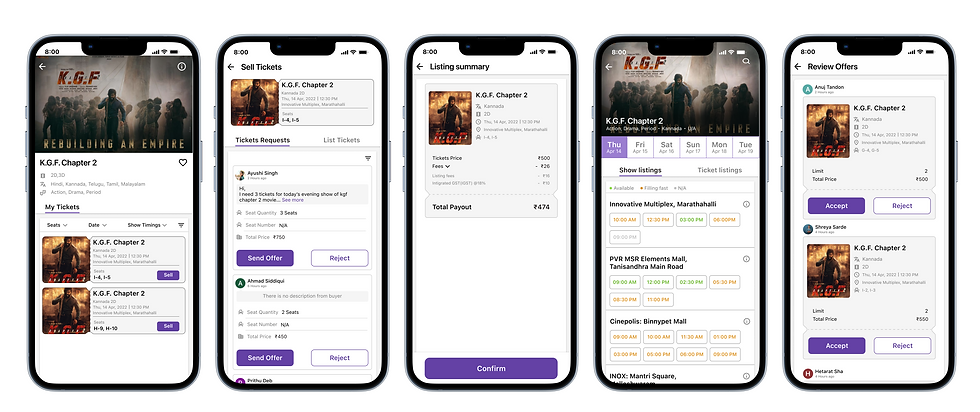
Bookeaz - UX Case study
an app that provides booking and resale services for movie tickets.
Role
UI/UX Designer (solo project)
Timeline
Feb - May 2022
Tools used
Figma, paper & pencil
Problem
One of the most common problems faced by the majority of users while booking movie tickets is that they sometimes miss out on getting tickets before they are sold and sometimes the seats they want are already sold. And later they miss the show or end up buying tickets that they are not satisfied with. Users want a service that can help them buy any ticket they want without worrying about getting it sold out.
Another problem faced by the users is that sometimes they want to cancel the tickets but some cinemas don't provide this service and if they do, they don't give the full refund.

Solution
Resale ticket service is the key.




My design process

Research
I did depth survey to understand users' behavior, problems, and needs. And later come up with insights and ideate.
From my previous experiences of using movie ticket booking apps. It's always frustrating when the ticket i want to book is already sold out. In these situations, I always end up changing the plan or buying tickets that I am not satisfied with.
I conducted a survey for 55 people of age 15-30 and these were the results.

Competative analisis + The gap
I proceeded to do an in-depth competitive analysis to make a list of features that were missing from our products, check out how others solved the problem, and find out how could we improve on it in my solution.
The competition had no resale ticket service.
While keeping the above statistic in mind, I analyzed the 4 most popular movie ticket booking apps in India. I found that almost none of them had a resale ticket service. This then became my opportunity for a solution.

Persona & Journey map
I created a persona and journey map of our end-users to build empathy, tell stories, and help myself understand how the users would experience the product.



Information architecture
I proceeded to create information architecture before starting the designing process to have a clear idea to structure the product and follow the pattern to create flows.

Wireframe & lo-fi prototype
This was the first thing I did before actually designing. I proceeded to do a wireframe and lo-fi prototype because I could conduct usability tests and iterate them before designing the final product. I wanted to make sure the final product is good.




Paper wireframes




Digital wireframe

Lo-fi Prototype
Usability test
Usability test + Affinity Map
After creating a lo-fidelity prototype, I conducted a usability test interview with 3 people and found some which I then organized through affinity mapping. Below are the few question I asked them to know if the product would need some iteration.




Interview questions
-
Were you able to complete the task?
-
Did you feel confused at any point while completing the task? If yes can you tell me more about it?
-
Did you find anything difficult to understand? If yes please tell me about it?
-
Do you think any part that should be improved or added?
-
Tell me about the time in your life when you felt hard to find movie tickets.


Themes & insights
Based on the affinity map, I generated the following themes and insights.

Iterations
Based on various feedback and insights from the usability test, I iterated my design over 3 weeks and came up with these 3 major improvements.




The final product



Conclusion & Lessons learned
This was my first ever UX project 😃. More than the output, I am grateful to have been through the process of an entire Ux design so I know now what it's actually like. However, the following are the few things I have learned.
1. Research as much as you can. One of the biggest lessons I have learned from this project is that conducting research interviews is crucial in the design process.
2. Iteration is the key. I believe that a product can be close to perfect depending on how much iteration is done on it. I am saying this because, my final product is far better than what I expected the product should be initially, It has happened only because of repeated iterations.
3. You didn't fail, you just found another way that didn't work. After multiple mistakes in this project. I am thankful that I constantly iterated it, and I believe I have pushed myself to make the app the best I could.